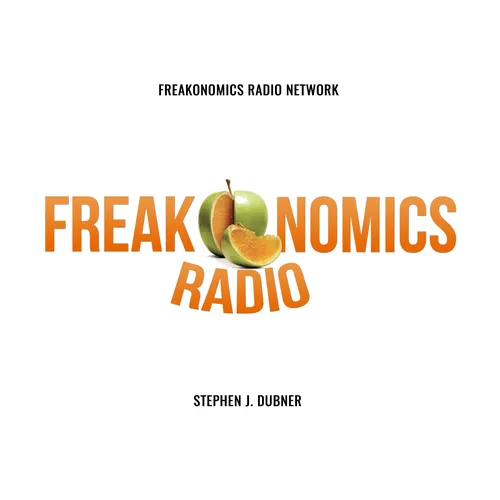
Freakonomics Radio
Freakonomics co-author Stephen J. Dubner uncovers the hidden side of everything. Why is it safer to fly in an airplane than drive a car? How do we decide whom to marry? Why is the media so full of bad news? Also: things you never knew you wanted to know about wolves, bananas, pollution, search engines, and the quirks of human behavior.
To get every show in the Freakonomics Radio Network without ads and a monthly bonus episode of Freakonomics Radio, start a free trial for SiriusXM Podcasts+ on Apple Podcasts or by visiting siriusxm.com/podcastsplus.
- Update frequency
- every 5 days
- Average duration
- 41 minutes
- Episodes
- 857
- Years Active
- 2010 - 2025

165. The Perfect Crime
If you are driving and kill a pedestrian, there's a good chance you'll barely be punished. Why?

164. Which Came First, the Chicken or the Avocado?
When it comes to exercising outrage, people tend to be very selective. Could it be that humans are our least favorite animal?

163. What’s More Dangerous: Marijuana or Alcohol?
Imagine that both substances were undiscovered until today. How would we think about their relative risks?

162. “If Mayors Ruled the World”
Unlike certain elected officials in Washington, mayors all over the country actually get stuff done. So maybe we should ask them to do more?

161. How to Make People Quit Smoking
The war on cigarettes has been fairly successful in some places. But 1 billion humans still smoke -- so what comes next?

160. Why Everybody Who Doesn’t Hate Bitcoin Loves It
Thinking of Bitcoin as just a digital currency is like thinking about the Internet as just e-mail. Its potential is much more exciting than that.

Women Are Not Men (Rebroadcast)
In many ways, the gender gap is closing. In others, not so much. And that's not always a bad thing.

159. “It’s Fun to Smoke Marijuana”
A psychology professor argues that the brain's greatest attribute is knowing what other people are thinking. And that a Queen song, played backwards, can improve your mind-reading skills.

158. Is Learning a Foreign Language Really Worth It?
Yes, it expands the mind but we usually don't retain much -- and then there's the opportunity cost.

157. Why Are Japanese Homes Disposable?
In most countries, houses get more valuable over time. In Japan, a new buyer will often bulldoze the home. We'll tell you why.

156. Why Marry? (Part 2)
The consequences of our low marriage rate -- and if the old model is less attractive, how about a new one?

154. What You Don’t Know About Online Dating
Thick markets, thin markets, and the triumph of attributes over compatibility.
This episode is included in the Freakonomics #smartbinge podcast playlist at wnyc.org/smartbinge

153. Reasons to Not Be Ugly
The "beauty premium" is real, for everyone from babies to NFL quarterbacks.

152. Everybody Gossips (and That’s a Good Thing)
The benefits of rumor-mongering

Fear Thy Nature (Rebroadcast)
What "Sleep No More" and the Stanford Prison Experiment tell us about who we really are.

151. Are We Ready to Legalize Drugs? And Other FREAK-Quently Asked Questions
Dubner and Levitt talk about fixing the post office, putting cameras in the classroom, and wearing hats.

150. What’s the “Best” Exercise?
Most people blame lack of time for being out of shape. So maybe the solution is to exercise more efficiently.

Save Me From Myself (Rebroadcast)
A commitment device forces you to be the person you really want to be. What could possibly go wrong?

149. Pontiff-icating on the Free-Market System
The Pope just gave it to the global economy with both barrels. Was he right to do so?
